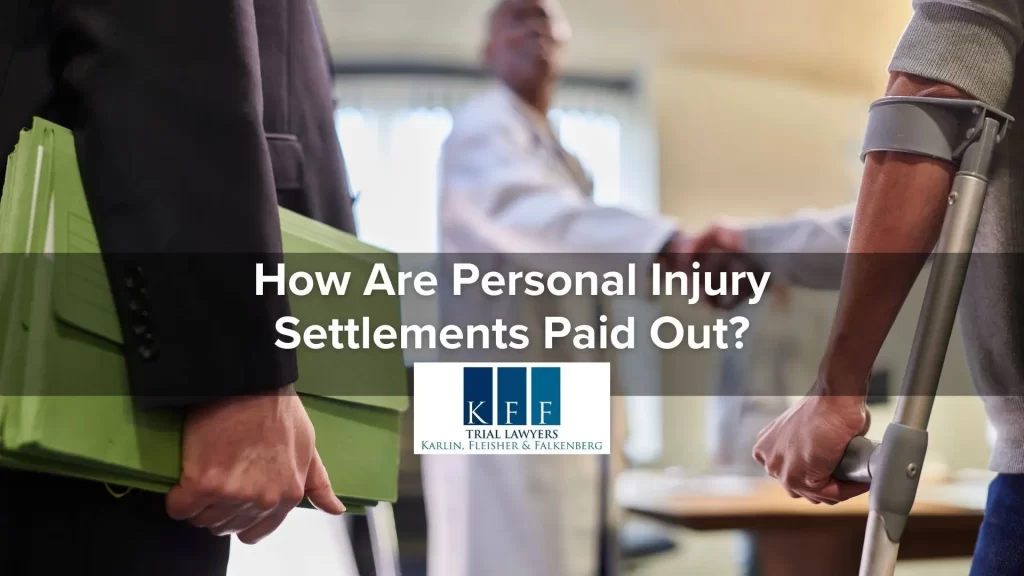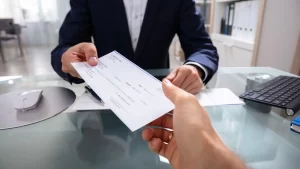 Wondering how personal injury settlements are paid out? When you settle a personal injury case, the check you receive won’t be the same as the settlement amount you agreed to. That’s because multiple expenses must come from your settlement before you get your share.
Wondering how personal injury settlements are paid out? When you settle a personal injury case, the check you receive won’t be the same as the settlement amount you agreed to. That’s because multiple expenses must come from your settlement before you get your share.
If you hired an attorney, they would take a portion of your settlement to pay their legal fees and case-related costs. You might have outstanding medical bills that part of your settlement can cover.
You should understand the financial aspects of a personal injury settlement, so you know what to expect. Here you will learn everything you need to know about the steps that occur after you and your lawyer settle your case.
Sign the Release Form
The insurance adjuster will send your attorney a release form that you must sign if you reach a settlement agreement. The release should include the settlement amount and other terms of the arrangement. Reviewing it with your attorney before signing is essential. You should notify the insurer if you notice any errors so they can correct the document.
A release form also contains your promise not to pursue additional compensation for the accident in the future. It releases the insurance company from further liability for your injury and losses.
Wait for the Settlement Check
The insurance adjuster will review the release and other paperwork to confirm their accuracy. Depending on the size of the company and the required procedures, multiple people might have to review your claim before signing off on releasing the settlement check.
Typically, the check goes to your lawyer if you retained legal representation. Your lawyer will deposit the check in their firm’s account and use the funds to settle the expenses you owe.
Pay Outstanding Debt
Sometimes personal injury lawyers negotiate medical bills with healthcare professionals and facilities when treatment begins. Many medical providers are willing to work with accident victims and will agree to wait for the settlement money before demanding payment. This helps the injured person avoid the financial burden of treating an injury right after it occurs.
If they agree, your lawyer will draft and sign a document that formalizes your agreement to pay your owed medical bill with money from your insurance settlement. In return, your doctors would agree to place a hold on your account, so it doesn’t go to collections.
Your lawyer might also negotiate for lower balances, so you’re not obligated to pay the full amount. That means you might walk away with more of your settlement.
Pay Legal Fees and Costs
Many personal injury attorneys take cases on contingency. That means they don’t collect any legal fees or costs upfront when a client hires them. Instead, they wait until a settlement or jury verdict is paid to recover their fees. The contingency fee is often around 25 to 33 1/3 percent of the monetary award. It might go up to 40 or 45 percent if the case goes into litigation.
When you first hired your attorney, you would have signed an engagement letter that outlines the percentage of your settlement they would take in legal fees and whether they will take costs from your settlement. Once your check arrives, and the medical bills are paid, your lawyer will take the agreed-upon percentage from your compensation for their fees. They will also likely take a portion to cover case-related expenses, such as medical records requests, copying fees, and court costs.
 Receive the Final Check
Receive the Final Check
Once your attorney pays off your account balance, they will write your final settlement check. The amount of money left over is yours.
Additional Considerations
At the time of settlement, your lawyer can discuss payment options on your behalf with the insurance company if you don’t want to receive your settlement as one lump sum payment. Other methods might be available if you worry about handling a large amount of money.
You can create a plan to receive smaller payments over a fixed period. You might want the money deposited into your checking account when your monthly bills are due. Reaching out to a financial planner is beneficial. They can review your finances and advise you on an installment plan that meets your needs.
More good news: personal injury settlements aren’t taxable. The compensation you receive isn’t income, so you don’t have to report it when you file your return.
Injured in an Accident Contact Karlin, Fleisher & Falkenberg, LLC Today
Karlin, Fleisher & Falkenberg, LLC has represented injured clients since 1970. We fight to achieve the best possible results each time we take on a personal injury case. You can count on our team to guide you through the process of how personal injury settlements are paid out and to protect your rights while aggressively pursuing the compensation you deserve.
If you sustained injuries in an accident due to someone else’s wrongdoing, call Karlin, Fleisher & Falkenberg, LLC at 312-346-8620 or contact us online for a confidential consultation with a dedicated Chicago personal injury lawyer.
Related Reading:

 Receive the Final Check
Receive the Final Check